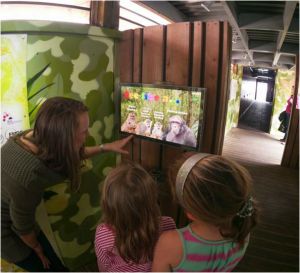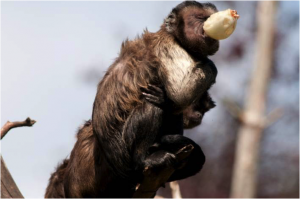What is your scientific background?
I started out as a biologist (well zoologist really but my undergrad degree is in Biology despite the fact I did all the zoology modules) studying at the University of Dundee. It was as part of my fourth year that I specialised into animal behaviour and in particular primate behaviour – I thought it was fascinating, particularly all the different types of social behaviours in so many primate species. I took a gap year afterwards to work out what I wanted to do next and it was then I decided a Ph.D. in primate behaviour was the only way forward.
I contacted Prof Andy Whiten at the University of St Andrews who I wanted to work with and told him about this goal, he invited me to come for lunch and discuss primates more. It was then when he told me about the “Living Links Centre to Human Evolution” Centre, a new research center that he was director of at Edinburgh Zoo and my Ph.D. was born, studying social behaviour and social learning in capuchin and squirrel monkeys that lived there. I accepted my Ph.D. in Psychology the month before it started, packed my bags and moved back to Scotland. Although I was technically a student of St Andrews I pretty much spent my whole time in Edinburgh Zoo working with the capuchin and squirrel monkeys in the zoo, I even spent six months living in the zoo when I was running experiments Monday to Saturday.
While finishing writing up my thesis I took up a research assistant position studying young children (my first time investigating the naked apes), and couldn’t believe how quick experiments went with working with them, no breeding season to contend with, and young children really do love getting stickers for doing just about anything! From then onwards, I have completed two postdoctoral positions, working with children and monkeys and I still love observing their social behaviour and learning new things from both species every day.

How did you choose your field of study?
I always loved science from a young age, exploring the Yorkshire hills where I grew up with my family and going off on family treks with our dogs. Always having a keen interest in various animals, and enjoying learning more about science, it wasn’t a surprise that I went on to study Biology for my undergrad. My love and fascination with primates really started when I was given an amazing opportunity during my undergrad to go out with the Natural History Group to Trinidad and Tobago to study wild capuchin monkeys!!! This was an amazing experience for me, and even despite the killer bees (probably one of the only times in my life I have been silenced!), jumping spiders, anaconda in the swamps, and a snake that could kill you in six minutes if you got bitten; I totally thrived and loved the experience of studying the monkeys. I was a spotter and my job was to follow the focal monkey, calling out the behaviour back to a scribe who would record it; first-hand experience observing a wild monkey, it was nothing short of an amazing experience for me. When I got to the end of my third year and was looking at the modules for my fourth year, it was a tough decision to decide if I wanted to focus on genetics or behaviour, but this experience really helped seal the deal for me, and behaviour and monkeys where my hook. Since then, I’ve specialised into social behaviour, as primates have such a varied range of social behaviours, it’s allowed me to travel down a fantastic road of discovery learning more about the way they learn and interact. I’ve spent my days over the last 8 years observing primates so I suppose you could call me a “people primate watcher”.

Did you ever doubt your abilities as a scientist? Why? How did you handle these situations/feelings?
Of course, and I think most academics would feel the same, though it isn’t often talked about. Imposter syndrome (feeling as though you don’t belong, or are a fraud) is very real, even outside of doing a Ph.D. I think this comes from working in an area in which success is often measured by outputs, numbers of papers published, successful grant applications, etc. I’ve had papers rejected and unsuccessful grant applications and although they are hard to deal with, my first go to method to deal with it is to talk to others, both academics and non-academic friends. You are more often than not, not alone in your feelings. One of the best ways to handle these feelings and situation is through acknowledging these things and making to talk and to do activities outside of academia. Try and not compare yourselves to others as more times than not, other people are in the same duck like situation; they appear to be swimming along quite peacefully but in fact, their feet are paddling away like crazy beneath them.
Which topic are you working on at the moment? Why did you choose this topic and how do you think you’ll make a difference?
My current post doc is mainly focused on another one of my great passions of being a scientist, science communication. I’m working with some colleagues at The University of St Andrews to develop some science resources to help to engage with others about different themes in Psychology and Neuroscience, such as the functions of the brain, healthy living, learning, and behaviour. The point of these resources is to help make science more accessible, dispel myths in science such as the neuromyth, “you only use 10% of your brain” and to generally help to spread a bit more love for STEAM subjects. I think this is a great way to make a difference and help to bring real scientific research into people’s lives through working with community groups, and schools. While doing this, I’ve also got time to work on some of my publications from my previous post-doctoral work which is great as I get to go back to some data and look at it in new ways. I’m sure it won’t be long until I’m following this work up with new studies with monkeys and children while always continuing to make time for public engagement…

During your career, have you been specifically mentored or supported by someone?
I’ve been really blessed to have such a supportive family throughout all my studies and moving around for different positions. Within academia, I’ve also made some great friends. Doing a Ph.D. is a really stressful time and some of the friends I made during this time have really stayed with me for life despite the fact that a lot of us have ended up on different continents! Two postdocs in particular that I worked with when doing my Ph.D. in Edinburgh Zoo, were particularly supportive of me, acting not only as academic mentors, but became like brothers – I couldn’t have done my PhD without either of them and wouldn’t have liked to.
What is the funniest or most memorable thing that has happened to you while working in science?
There are many things that have been memorable for me while working in science. I’ve had the opportunity to meet several great scientists, work in amazing places, and generally been amused/amazed/outsmarted by children and monkeys on a daily basis! For me, one of the times that sticks out most in my head as memorable was getting to work with a legend of Natural History. Approached by a TV company making a new documentary on natural curiosities and asked if I would be willing to help out with a segment they were doing on anointing (this is when monkeys rub pungent materials on their fur to help prevent insect bites) which I’d studied as part of my Ph.D. The series was being presented by Sir David Attenborough! I was star struck, to say the least. Attenborough has been a favourite of mine for years, growing up seeing his documentaries and being in awe of so many of the places and animals he described. Although, the TV Company decided to film the episode in England and I didn’t get the opportunity to meet Attenborough, together with Andy Whiten, I acted as a consultant for the program and helped to edit the script, and to top it off some of our capuchins from Edinburgh were even featured in the programme.

Do you come from an academic background?
No, not really. Both of my parents are trained accountants, but they have always been big advocates of the education to me and my sisters, and in fact, all three of us ended up as scientists. I’m the first person in my family to have a Ph.D. but all of my family have inquisitive tendencies. I’ve spent many a happy holiday exploring new places, spending hours in museums, visiting historic sites, and going off on walks, often ending up off the path which sometimes involved us ending up getting lost but stumbling across some amazing site or animal encounter (known to us only as Messer treks). Being blessed with a childhood like this, a supportive family, and a passion for science from a young age (sometimes even ending up in A&E with an experiment having gone slightly wrong…) and loving all manna of different animals I suppose it is no surprise that I’ve ended up in academia, getting to spend my days learning and observing others learning too.

Besides your scientific interests, what are your personal interests?
Outside of my research, I love nothing more than exploring, and being out in nature. Preferably with an animal companion, though humans are allowed too. Visiting a historic site, or rumbling hills and lakes are a particular favourite of mine. Spending much of my education, and now living in Scotland permanently, I am surrounded by beauty everywhere. I am a particular fan of watching rugby and the Sixth Nations, nothing quite beats sitting in Murrayfield with a peaty single malt in hand supporting the boys in blue. In the last two years, although it is an older tradition, I took up flower arranging, typically in church displays. It is something that I really enjoy, picking colours and different flowers, and spending time in the sanctuary of a quiet church putting flowers together into a display.
Emily can be found on twitter at @emilyjemesser or via email at ejem@st-andrews.ac.uk




